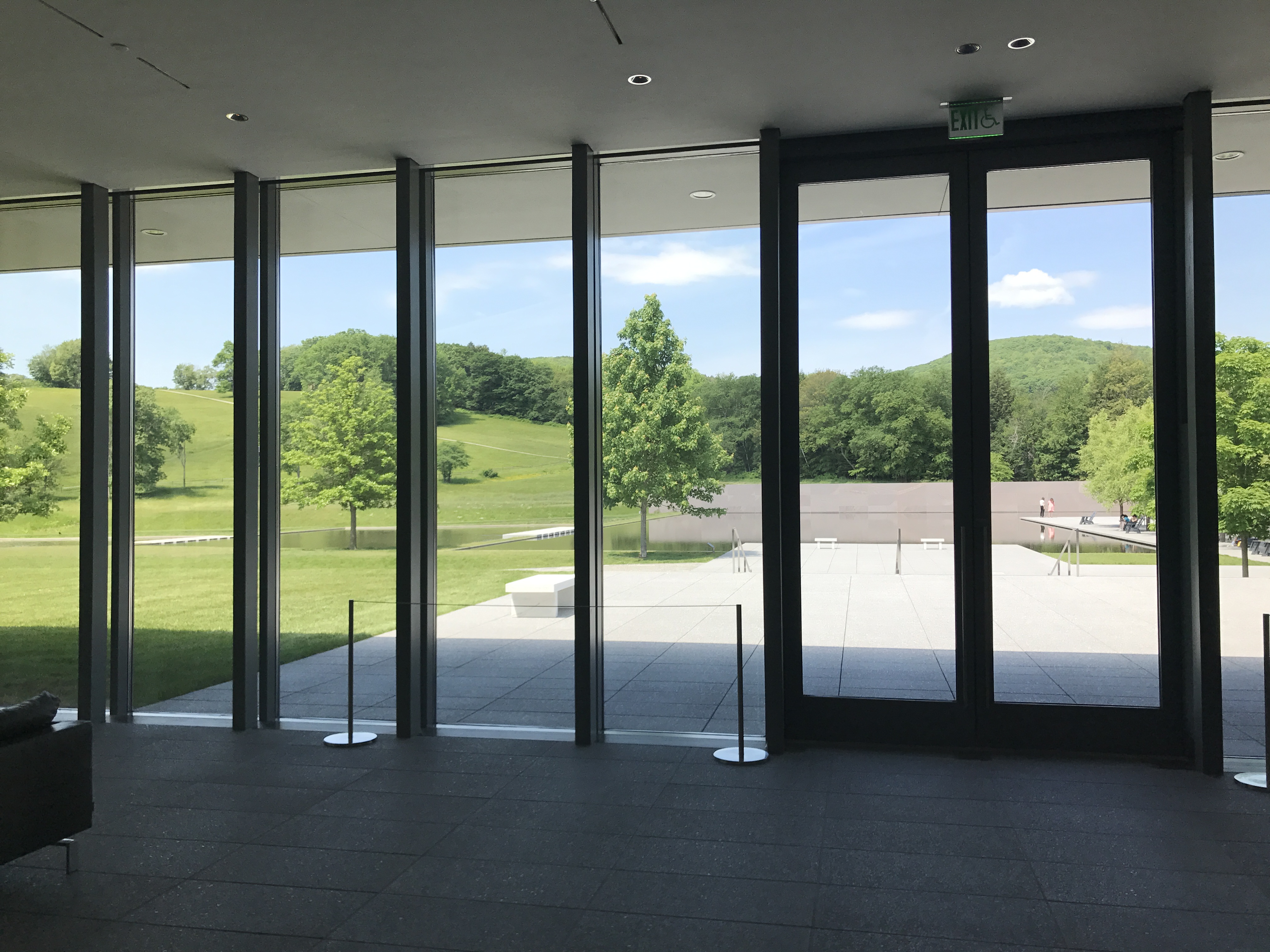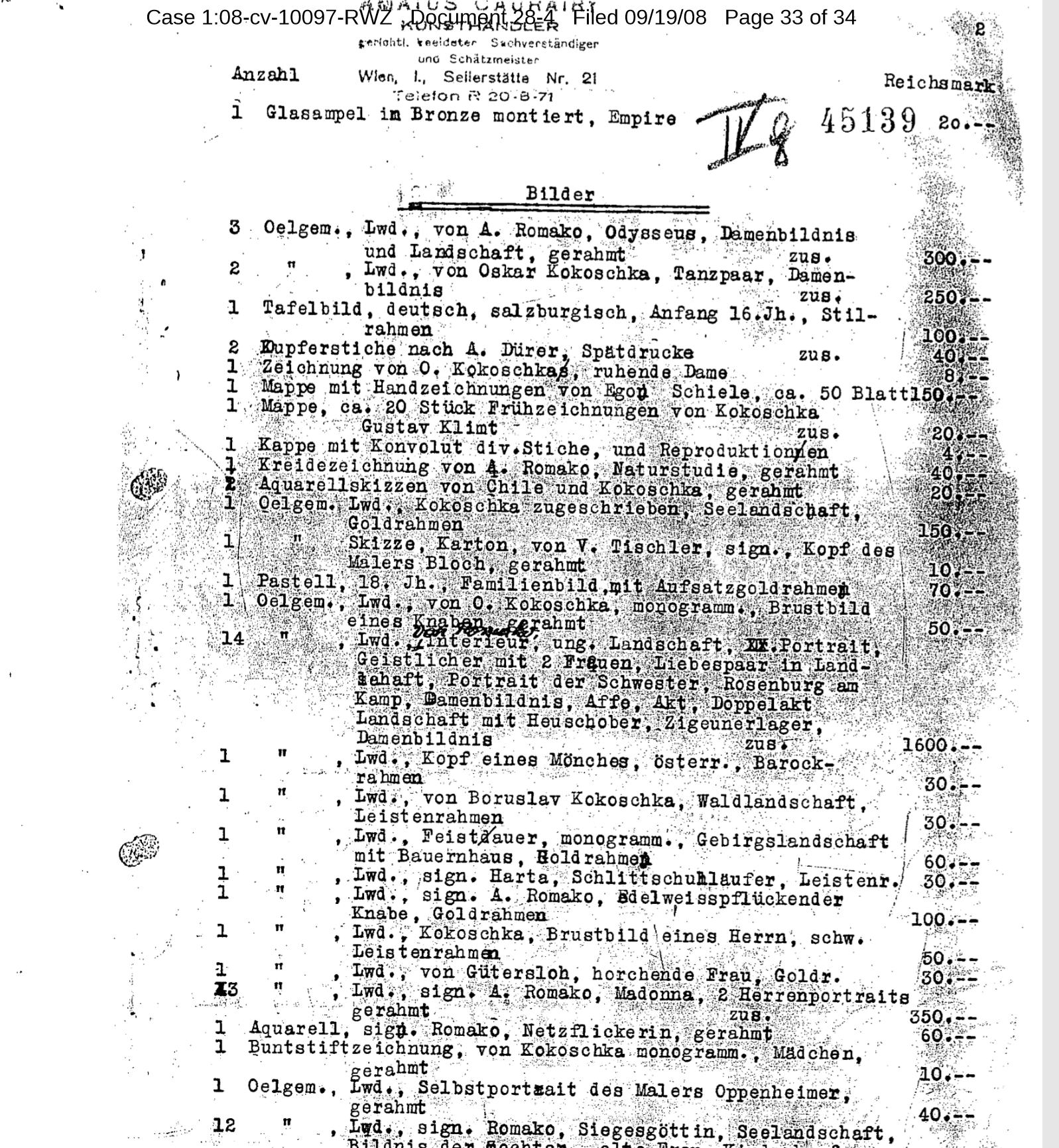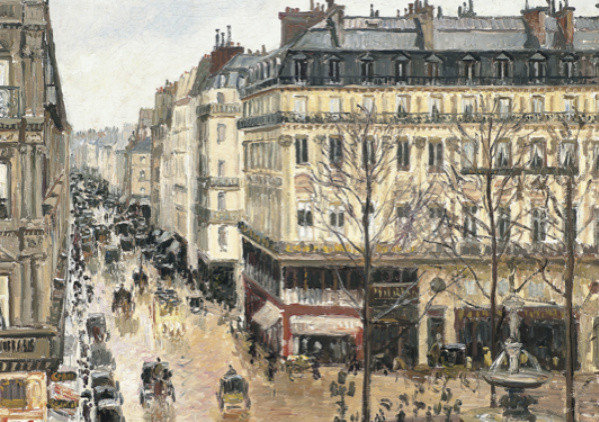September 21, 2022 Event—Issues on Art, Artifacts and Archeology
Topics: Boston Bar Association, Museum of Fine Arts Boston, Victoria Reed, Sadler Curator of Provenance, Ashley Mason, Malgorzata A. Mrózek, Fitch Law Partners LLP
New Law Requires Museums in New York to Display Information About Nazi Art Looting, May be More Complicated than it Looks
New York Governor Kathy Hochul has signed into law a new requirement requiring museums to indicate publicly any object in their collection that was displaced by the Nazis as part of what Congress has rightly called the largest organized theft of art in human history. The significance of this new rule is clear: New York is the center of the art world, and its museums hold a unique place of prominence. As readers of this blog or of my book A Tragic Fate-Law and Ethics in the Battle Over Nazi-Looted Art know, my view has long been that American museums vary widely in their candor and proactive approach to the issue of Nazi-looted art in their collections. Many have shown admirable initiative in probing their collections, while others have shown a regrettable passivity in waiting to receive and then deflect claims. Whether this bill will move the needle on that balance is the question. Transparency and disclosure have been the defining goals of the modern restitution era. This new law serves many of those ideals, but some unintended consequences may follow.
Topics: Metropolitan Museum of Art, American Alliance of Museums, Nazi-looted art, Foreign Sovereign Immunities Act, Washington Conference on Holocaust Era Assets, Supreme Court, Washington Principles on Nazi-Confiscated Art, AAM, Museum of Modern Art, Nuremberg race laws, Washington Conference Principles on Nazi-Stolen Ar, Association of Art Museum Directors, Washington Department of Labor and Industries, Solomon R. Guggenheim Museum, Museum of Fine Arts Boston, AAMD, Military Government Law 59, State Department, Holocaust Expropriated Art Recovery Act, HEAR Act, A Tragic Fate, Law and Ethics in the Battle Over Nazi-Looted Art, Governor Kathy Hochul, Reich Citizenship Law, Animal House, Kevin Bacon
Harvard Can be Sued Over Louis Agassiz Slave Daguerreotypes from 1850
The Supreme Judicial Court of Massachusetts (the state’s highest court) recently issued a surprising decision that permits claims against Harvard arising out of a series of daguerreotypes taken of the plaintiff’s ancestors in the 19th century by famed professor Louis Agassiz to proceed. While the SJC affirmed the dismissal of the plaintiff’s property claims that sought outright ownership, the court reinstated claims for emotional distress. The decision held that the manner in which an educational institution responds to a grievance about something in its possession may itself be actionable in the context of the institution’s relationship to the historical facts. In stretching the bounds of the traditional causes of action for negligent or reckless infliction of emotional distress to reach a sympathetic set of facts, however, the SJC has effectively abolished limits on museum liability for collections created under problematic circumstances where the response to such claims is attacked creatively enough. The issue is not whether the result is fair to Harvard, or whether the plaintiff’s family deserves recognition and justice for what was done—they do. The problem with cases that are hard or impossible to limit is that they may lead to socially positive outcomes in one instance, but can be weaponized in the next. In an era when all manner of actors are politicizing what universities should or shouldn’t teach, this opinion creates innumerable opportunities for mischief. As a result, it raises First Amendment and Due Process concerns that Harvard might plausibly petition the Supreme Court to address.
Topics: due process, Supreme Judicial Court, SJC, Harvard, First Amendment, Museum of Fine Arts Boston, NAGPRA, Tamara Lanier, negligent infliction of emotional dismiss, Louis Agassiz, Daguerreotype, Renty Taylor, Delia Taylor, MFA, reckless infliction of emotional distress, Philip Guston, Drew Gilpin Faust
Fate of Museum Collections and Endowments Presents Hard Questions in Hard Times
Since analyzing the likely consequence of gallery and auctioneer insolvencies last month, we have been keeping an eye on how the economic crisis borne of the COVID19 pandemic is affecting the art world. Essentially every museum in the world has had to close its doors in the last month, with the previously unimaginable effect of a 100% drop in attendance revenue. Every museum, from the largest and best-endowed to the smallest and cash-strapped, is grappling with how to sustain its people, its mission, and its future. There are no easy answers, but the Association of Art Museum Directors issued yesterday an interesting update to its longstanding ethical guidelines concerning deaccessioning and restricted assets. As I remarked in a conversation with ArtNews yesterday on the topic, the question of what—and who—an endowment and an art collection is for have never been more relevant, or more difficult to answer. When Brandeis proposed to close the Rose Art Museum in 2009 in the midst of the last financial crisis, the effects were long-lasting. I have negotiated considerable specific requirements to gifts on behalf of museums and donors to account for what, before that event, many had not considered. What will this catastrophe, which is already far worse, bring?
Topics: Brandeis, Metropolitan Museum of Art, American Alliance of Museums, Rose Art Museum, Association of Art Museum Directors, International Council of Museums, Museum of Fine Arts Boston, AAMD, Berkshire Museum, North Adams, Mass MoCA, COVID19, Board of Regents, Brian Allen, CARES Act, Financial Accounting Standards Board, Clark Art Institute, National Review
Ten Years Later—Lessons Learned from the Museum of Fine Arts Boston Kokoschka Case
There has been some renewed interest in the case a decade or so ago involving a claim by the heir of Oskar Reichel’s family to a painting in the Museum of Fine Arts Boston: Two Nudes (Lovers) by Oskar Kokoschka. In response I’ve decided to post an excerpt from my book A Tragic Fate—Law and Ethics in the Battle Over Nazi-Looted Art (ABA, 2017).
It has been suggested that the MFA somehow concealed its rationale or the documentary evidence on the basis of which it concluded that the painting should not be restituted. That is simply not so, however. The MFA’s now-curator of provenance, Dr. Victoria S. Reed, authored and the MFA filed an exhaustive report of the museum’s research into the case, accompanied by primary source documents. Whether one agrees or disagrees with its conclusions, the report has been publicly available for more than eleven years. It’s no secret that I have been complimentary of the MFA’s provenance research and transparency in the case—and I don’t think anyone would accuse me of being unsympathetic to claimants generally.
The key reasons for the MFA’s conclusions that the painting had not been sold under duress included the fact that Oskar Reichel’s sons pursued restitution claims vigorously (and successfully) for both real and personal property, including paintings. They never identified this painting in their claims to looted property, however. In addition, the MFA found—and filed publicly—correspondence from Oskar’s last surviving son Raimund from 1982 that explained that the MFA painting was among those that Oskar had given to Otto Kallir to sell in the USA:
Exhibit 65 to Dr. Reed’s Report
The MFA drew the conclusion, to which there was no specific evidence to the contrary, that this was in contrast to the property that had been taken from Oskar. This is in the context of the general presumption of invalidity for transactions between 1933 and 1945 involving persecuted groups.
I have been very critical of museums that I believe have not adhered to the spirit of the Association of Art Museum Directors’ guidance on Nazi-looted art claims where I think it is appropriate. But in my opinion—and that’s all it is, my opinion—the MFA is an example of a museum worthy of praise for following those principles of research and transparency (and not only with regard to Nazi-spoliation, but its collection generally).
Please do note that some of the analysis of the applicable statute of limitations has been superseded by the 2016 Holocaust Expropriated Art Recovery Act (HEAR Act), but the case went to a final judgment before that law was passed and was thus not affected by it.
I urge you to consider the case with an open mind and reach your own conclusions. I have done my best to explain my thinking, which you may judge for yourself. The press coverage at the time was very critical (some of which resonated for me until I reviewed the case in detail), which in hindsight is probably attributable in part to the fact that I don’t recall any contemporary coverage that addressed specifically the actual research that the MFA did and made public.
The following is re-published with the permission of the author, and may not be copied, reproduced, or republished in any fashion without express written permission of the author, whom you may contact using the links on this page. A Tragic Fate—Law and Ethics in the Battle Over Nazi-Looted Art © Nicholas M. O'Donnell (2017) is available in hardcover and Kindle editions on Amazon.com. I hope you find it informative and thought provoking.
* * *
Topics: Galerie St. Etienne, Nazi-looted art, Association of Art Museum Directors, Claudia Seger-Thomschitz, Oskar Kokoschka, Museum of Fine Arts Boston, Holocaust Expropriated Art Recovery Act, HEAR Act, A Tragic Fate, Two Nudes (Lovers), Oskar Reichel, Otto Kallir, Victoria S. Reed, Otto Nierenstein
Rich Man/Poor Man? The Berkshire Museum and Why Deaccessioning is so Frustrating
Two wonderful museums recently announced plans to sell major works of art. In one case, some 40 paintings, American masterpieces among them, will be sold at auction. In another, more than 400 photographs will also be sold. The former case has prompted a nationwide outcry, the latter…effectively nothing. The differences and similarities between the two underscore the aspirational rules that govern what is known as “deaccessioning,” but also remind us that principles and the goals they are meant to reach are not always the same thing.
Topics: Metropolitan Museum of Art, Delaware Museum of Art, American Alliance of Museums, Lee Rosenbaum, MoMA, Deaccessioning, AAM, Norman Rockwell, Association of Art Museum Directors, Alexander Calder, Museum of Fine Arts Boston, AAMD, Pennsylvania Academy of Fine Arts, Pittsfield, General Electric, Waconah Park, Berkshire Museum, Housatonic, Lake Onota, Frederic Church, Albert Bierstadt, Zenas Crane, Williamstown, Lenox, North Adams, Mass MoCA, Felix Salmon
U.S. Museums and Looted Art—Is it Whether you Win or How you Play?
A recent report by the World Jewish Restitution Organization (WJRO) has made strong criticisms of American museums with respect to their handling of Nazi-looted art claims. In particular, the report criticizes the assertion of timeliness defenses such as statutes of limitations. The report focuses in particular on cases involving the Museum of Fine Arts, Boston, the Norton Simon Museum in Pasadena, the Toledo Museum of Art, and the Fred Jones, Jr. Museum at the University of Oklahoma. There is no state control over the vast proportion of art in America the way there is in most European countries, and thus, no possibility of singular, nationalized approaches. In response to the report, some of the museums mentioned have defended their strategies, though in some cases the players are talking past each other. What is undeniable is that whether as a function of the nature of U.S. museums (largely private, rather than public), it is hard to say there is a coordinated approach to the issue, good or bad. The report is lengthy and detailed, and well worth a read in depth that space here does not permit. In some ways, the question it poses boils down to this: is determining the historical truth the obligation of everyone involved or is there some room to prevail without addressing the larger issues?
Topics: Toledo Museum of Art, Street Scene in Tahiti, Léone Meyer’s, American Association of Museums, Two Nudes, La bérgère, AAMD Task Force on the Spoliation of Art during th, Thyssen-Bornemisza Collection, Rue St. Honoré après-midi êffet de pluie, University of Oklahoma, Cassirer, Nazi-looted art, Washington Conference on Holocaust Era Assets, Fred Jones Jr. Museum, Washington Principles on Nazi-Confiscated Art, World Jewish Restitution Organization, WJRO, Association of Art Museum Directors, Restitution, American Alliance of Museums AAM, World War II, Paul Gaugin, Camille Pissarro, Oskar Kokoschka, Museums, Museum of Fine Arts Boston, AAMD, Norton Simon Museum in Pasadena
Cassirer Heirs' Claims to Pissarro Work Revived by Appeals Court, the Year 2013 Shows that the Tide for Restitution May be Shifting Again
The U.S. Court of Appeals for the 9th Circuit restored last week claims by heirs of Lilly Cassirer against the Thyssen-Bornemisza Collection for the return of the Camille Pissarro painting Rue St. Honoré, après-midi, êffet de pluie.
Topics: Nuremberg laws, Schwabinger Kunstfund, Cornelius Gurlitt, Lilly Cassirer, California Code of Civil Procedure § 338(c), Dorothy Nelson, Thyssen-Bornemisza Collection, Julius Schoeps, Rue St. Honoré après-midi êffet de pluie, Claude Cassirer, Von Saher v. Norton Simon, de Csepel, Jacques Goudstikker, California Code of Civil Procedure § 354.3, Gurlitt Collection, Foreign Sovereign Immunities Act, Hans Sachs, Von Saher v. Norton Simon Museum of Art at Pasaden, Madame Soler, Bundesgerichtshof, Hildebrand Gurlit, Entartete Kunst, Hans-Heinrich Thyssen-Bornemisza, Hungarian National Gallery, Nazis, Munich, Deutches Historisches Museum, FSIA, Preemption, Gurlitt, Harry Pregerson, Restitution, field preemption, Marei Von Saher, Herzog collection, Bavaria, Claudia Seger-Thomschitz, Looted Art, World War II, Foreign Sovereign Immunities, Pinakothek der Moderne, degenerate art, Altmann v. Republic of Austria, 578 F.3d 1016, Freistaat Bayern, beschlagnahmte Kunst, Camille Pissarro, Kim McLane Wardlaw, Nürnberger Gesetze, Raubkunst, Museum of Fine Arts Boston, Cassirer v. Thyssen-Bornemisza Collection, verschollene Kunst, Kunstfund München
REMINDER Restitution and Repatriation: the Return of Cultural Objects at DePaul University November 14, 2013
A reminder of this Thursday's event, all the more timely as the Gurlitt collection fallout continues:
Topics: cultural property, Center for Art, Field Museum of Natural History, Jane Levine, Stanford University, Thomas R. Kline, Museum, Denver Museum of Nature and Science, Susan Taylor, Penn Museum, David Franklin, Frank Lord, University of Pennsylvania Department of Anthropol, Simon Frankel, Covington & Burling LLP, Lori Breslauer, Charles Brian Rose, Morag Kersel, Christopher Rollston, DePaul University, Steve Nash, Restitution, Rebecca Tsosie, Events, Richard Leventhal, Gary Johnson, World War II, Julie Getzels, Herrick Feinstein LLP, WilmerHale, Peter Neiman, University of Pennsylvania, Art Institute of Chicago, New Orleans Museum of Art, Andrews Kurth LLP, Toyozo Nakarai Emmanuel Christian Seminary, and Cultural Heritage Law, Arizona State University, Sotheby's, Cleveland Museum of Art, Museum of Fine Arts Boston, Chicago Historical Society, Victoria Reed, Patty Gerstenblith
MFA and Harvard To Keep Iranian Antiquities, FSIA/Seizure Questions for Museums Left Unanswered
The First Circuit Court of Appeals has affirmed a win for the Museum of Fine Arts Boston and Harvard University concerning possession of a number of Iranian antiquities. The ruling left open, however, some interesting questions about the Foreign Sovereign Immunities Act (FSIA). In particular, the First Circuit did not have to rule on whether antiquities in a museum are “property” of a source country that could be used to satisfy an unrelated judgment, or whether a museum displaying an object from a foreign country makes the object “used in commercial activity” such that it is no longer immune from seizure under the FSIA.
Topics: cultural property, Terrorism Risk Insurance Act of 2002, 28 U.S.C. § 1610, 22 U.S.C. § 2259, Rubin v. Islamic Republic of Iran, 116 Stat. 2322, Foreign Sovereign Immunities Act, § 201 (a), Harvard University, Restitution, Foreign Sovereign Immunities, Antiquities, Immunity from Seizure Act, Museums, Museum of Fine Arts Boston, Pub. L. No. 107-297







